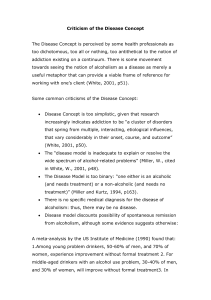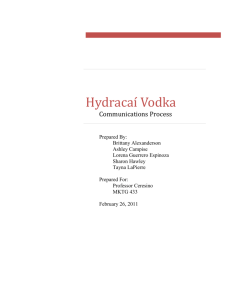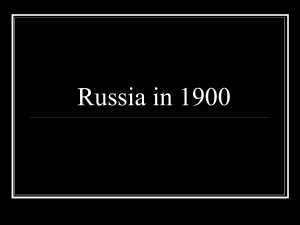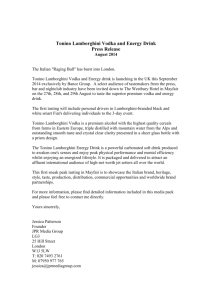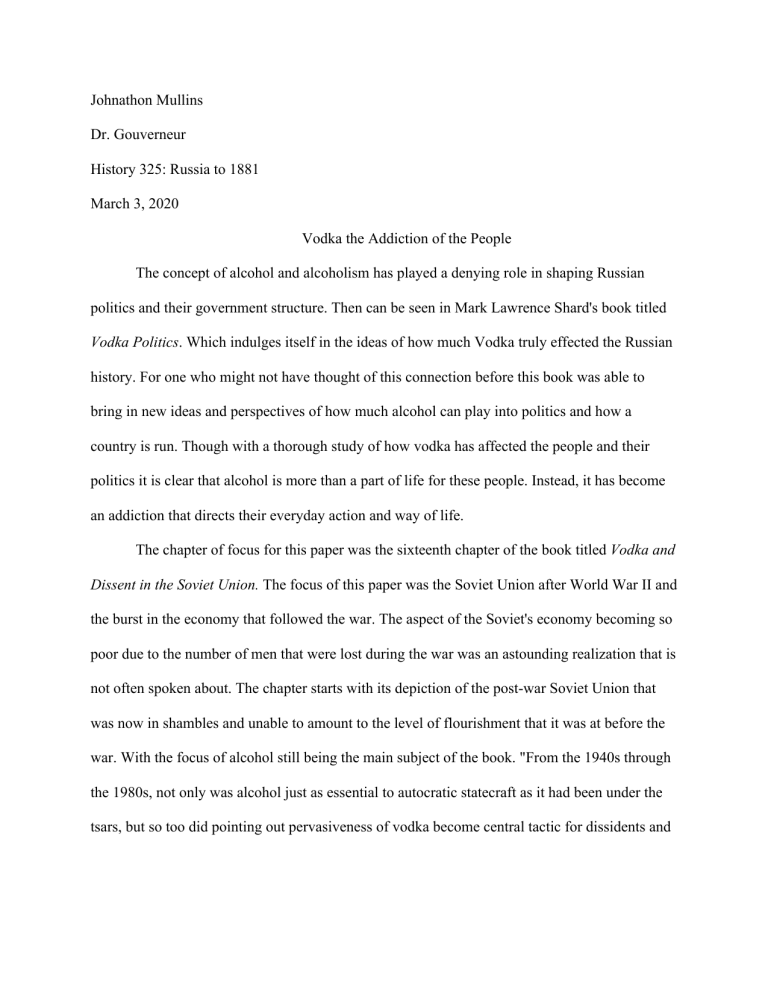
Johnathon Mullins Dr. Gouverneur History 325: Russia to 1881 March 3, 2020 Vodka the Addiction of the People The concept of alcohol and alcoholism has played a denying role in shaping Russian politics and their government structure. Then can be seen in Mark Lawrence Shard's book titled Vodka Politics. Which indulges itself in the ideas of how much Vodka truly effected the Russian history. For one who might not have thought of this connection before this book was able to bring in new ideas and perspectives of how much alcohol can play into politics and how a country is run. Though with a thorough study of how vodka has affected the people and their politics it is clear that alcohol is more than a part of life for these people. Instead, it has become an addiction that directs their everyday action and way of life. The chapter of focus for this paper was the sixteenth chapter of the book titled Vodka and Dissent in the Soviet Union. The focus of this paper was the Soviet Union after World War II and the burst in the economy that followed the war. The aspect of the Soviet's economy becoming so poor due to the number of men that were lost during the war was an astounding realization that is not often spoken about. The chapter starts with its depiction of the post-war Soviet Union that was now in shambles and unable to amount to the level of flourishment that it was at before the war. With the focus of alcohol still being the main subject of the book. "From the 1940s through the 1980s, not only was alcohol just as essential to autocratic statecraft as it had been under the tsars, but so too did pointing out pervasiveness of vodka become central tactic for dissidents and critics of Soviet autocracy."1 This entire question from Shard helps display just how important vodka was to the people of the Soviet Union during this time. Vodka truly was a necessity for the people. One stand out part of the chapter is the amount that alcoholism played on the natives of the Soviet Union no matter their class or social rank. Leonid Brezhnev the leader of the Soviet Communist Party from 1964 until 1982 when he passed away was known to be affected by alcohol in a great manner. "Anatoly Dobrynin- the Soviet Ambassador to the United Statesseemed particularly irked by Brezhnev’s incessant drinking, especially since he was usually on the receiving end of the general secretary’s drunken, late-night, prank calls on the kremlin’s hotline to the Soviet embassy in Washington.”2 As comical as this might sound to the reader, the idea of the leader of a country performing drunk prank calls at night is astounding. Sakharov who was a nuclear physicist and a Nobel peace prize winner would advocate for the detoxing of the Soviet Union. “Increasingly famous for advocating democracy and human rights, Sakharov understood alcohol’s centrality to the system of repression: trapped in fear, unable to emigrate, and deprived of a voice in politics, the dissatisfied Soviet people turned to “internal protest” that takes on “asocial forms”: drunkenness and crime.” 3 His fear for the Soviet Union being trapped in the same situations due to the fact that he believed due to their drunken nature they would never advance to the position that they needed to reach. Though it was clear that these ideas did not go over well with the people of the Soviet Union. For they proceeded to get drunk and take their drunk rage out in the manner of crimes. This amplifies the point that Sakharov made about how vodka and alcohol were not allowing the country to flourish. While 1 Schrad, Mark Lawrence. Vodka Politics, 236 Schrad, Mark Lawrence. Vodka Politics, 239 3 Schrad, Mark Lawrence. Vodka Politics, 241 2 also explaining that the roots of alcoholism are so deeply intertwined with the country that the idea of breaking free from the bottle turns the people into a fit of rage. Following the death of Soviet leader Brezhnev, the idea of vodka being a plague on the country by Sakharov. Drunkenness is our greatest national tragedy; it makes family life a hell, turns skilled workers into goldbricks, and is at the root of a multitude of crimes. The rise in drunkenness is a reflection of social crisis and evidence of our government’s unwillingness and inability to take on the problem of alcoholism. More recently, cheap fortified wines have become the favored means of turning people into drunkards and siphoning off surplus rubles. 4 This was known as “codename Soviet Vodka politics”5 with this taking place right after the death of the leader of the Soviet Union who was known by all to be an alcoholic, it is clear that this did not go over well. Many people would be angered by this event for they felt that this “denied individuals their basic human rights and hindered their personal fulfillment.”5 For many people, it wasn't a question of if they should drink for it had become a part of their identity they did not know life without alcohol. Even with the advocacy against vodka and alcoholism in the Soviet Union, this did not stop vodka form being one of the most paid-for commodity. (It is believed) "… by 1970 Soviets were spending 27 billion rubles every year on these "other foodstuffs," of which he estimated that 23.2 billion was spent on vodka."6 With that, the amount that people were willing to spend 4 Schrad, Mark Lawrence. Vodka Politics, 242 Schrad, Mark Lawrence. Vodka Politics, 242/ Ibid., 506 The Echoes of the anti-alcohol sentiment conveyed in his 1970 plea to Brezhnev. 6 Schrad, Mark Lawrence. Vodka Politics, 245 5 just on vodka alone seems to be an astronomical amount. This displays that vodka for the people had become a true addiction. For in a time of bad income and most people not having extra money to spend yet many still felt that they had to spend money to buy vodka to survive. With the majority of the country addicted to this drink, it is clear that vodka would play an integral role in their society for it was always present in their society. Later in the chapter, the idea of alcoholism being an addiction to the people of the Soviet Union would become even more prominent. It displays that not only is vodka an important part of the life of the adults but an important part of life of all ages. "the 1979 Siberian reports that 99.4% of men and 97.6% of women drink regularly, including 95% of girls under the age of 18, and that of those receiving anti-alcohol treatment for the first time, 90% were not yet 15, and one-third were not yet ten years old."7 These numbers are astronomical to have such a high amount of people involved that deeply into the act of drinking. It is hard to dispute the idea of vodka being an addiction to these people. The numbers of people who drink regularly begin as high as it is other stats that Schrad offers in his book about vodka become more clear. For the Soviet Union, alcoholism and vodka was more than a recreational drink it was a part of their life. Their leaders would be known publicly as drunks and were known to drink. The people of the country looked to the bottle for their way of life. The separation of the two would be impossible for too many of them grew up around the idea of vodka. Schrad’s book easily answers the question of did vodka influence the county into what it has become today by the pure volume of material that was available to answer this question. Of course, vodka and alcohol affected the country and created it into what has become due to the fact that many people do not know any other way of life than the life of a drunken man. There are many chapters like chapter 7 Schrad, Mark Lawrence. Vodka Politics, 250 eleven that display how vodka could become a central part of a war stagey. Yet with chapter sixteen, it is clear that vodka is ingrained into the life of the people. Taking Alcohol away from them would lead to nothing more than destruction and crime. Ibid., 506 The Echoes of the anti-alcohol sentiment conveyed in his 1970 plea to Brezhnev. Schrad, Mark Lawrence. Vodka Politics: Alcohol, Autocracy, and the Secret History of the Russian State. Oxford University Press, 2014.
